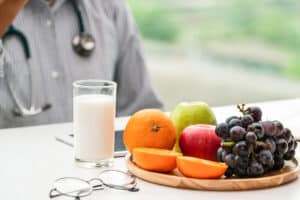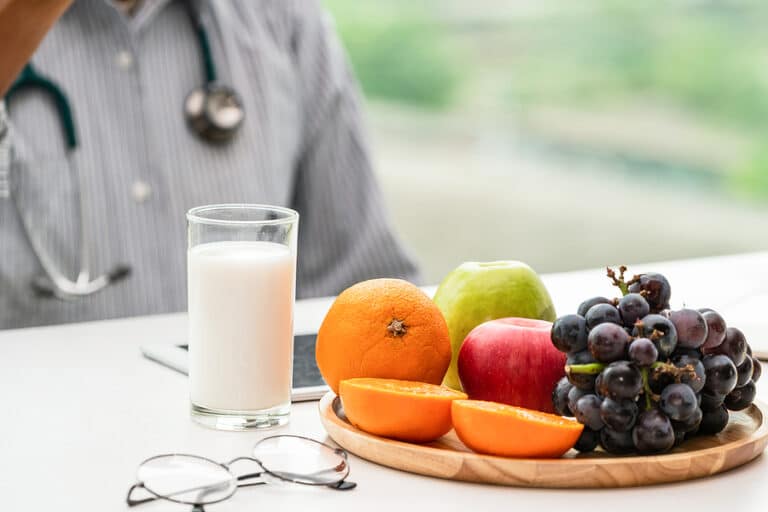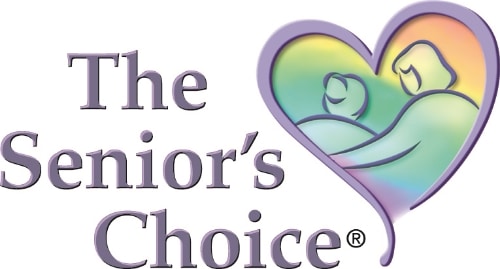
Antioxidants
Vitamins A and C are commonly low in older women and are two of the antioxidants that boost cell health. Eating fresh fruits and vegetables can help increase antioxidant intake.
If your mom will drink a smoothie for breakfast or a snack, blend a cup of almond milk with a cup of frozen berries. Add a banana for sweetness. That’s two servings of fruit in one beverage. It also adds some calcium, which is another nutrient your mom may not be getting enough of.
Calcium and Vitamin D
Calcium and vitamin D are essential for bone health. After menopause, estrogen diminishes, and that impacts bone strength. Osteopenia is common and if it’s ignored, it can progress to osteoporosis.
She should have her bone density checked. If she is found to have thinning bones, she needs to address it as it increases her risk of a bone fracture in a fall or if she drops something on her foot. Her doctor may recommend calcium supplements or to have your mom work with a dietitian.
Your mom needs to make sure she’s getting enough calcium and vitamin D. She’ll find them in enriched cereals and juices, milk and dairy products, kale, and canned sardines packed in oil.
Protein
Protein is essential for muscle health. If your mom isn’t getting enough, which is common in older adults, her muscles may not heal well or have the same amount of strength as when she was younger.
The good news is that protein is in many items. It’s in meats, nuts, tofu, and dairy. Almonds and pistachios are especially high in protein. You could make your mom a pistachio-crusted boneless chicken thigh or fish filet and improve her protein intake.
Vitamin B-12
Vitamin B-12 plays an important role in developing healthy red blood cells. It’s found in meats, including poultry, dairy, and fish. Vitamin B-12 is also in fortified cereals and juices.
A lack of vitamin B-12 can cause anemia, nerve issues, weakened muscles, and mood imbalances. If your mom is low on B-12, it’s something dietary changes can address.
Companion care at home helps your mom with meals. She’ll have a caregiver working with her each week to plan a menu and shop for missing ingredients. If she cannot leave her home, her caregiver can shop for her or order a delivery. Her caregiver also cooks meals and cleans up the kitchen after your mom eats.
It’s easy to schedule companion care at home services. Talk to an advisor about your mom’s care needs. Go over prices and schedules and arrange services.
If you or an aging loved-one is considering companion care at home in Joplin, MO please contact the caring staff at Adelmo Family Care today at (417) 206-4576.
To provide the safest and most qualified caregivers, John felt it was important to properly screen and train caregivers before they were invited into the homes of the families being care for.No caregiver is introduced to a client before being taught the Adelmo Standard.
Adelmo is German for Noble Protector, a name that projects what Adelmo Family Care strives to be. It is our goal to protect our elderly from having to move somewhere they do not want to go, while remaining safe, secure and independent.
Care is our Product and Independence is our Goal.We are there for you when you need to have some help to continue to live independently, at your direction, in your home. We will work with you to get you as fit as possible so you may become completely independent once again, if at all possible.
We provide compassionate care, a watchful eye and a helping hand to our clients and their families.
We can't wait to meet you!
Adelmo Family Care is a member of the Home Care Association of America, The Senior’s Choice, The Webb City Chamber of Commerce, The Joplin Area Chamber of Commerce and several local senior committees.
- Why Foot Care is Important for Seniors Living at Home - April 16, 2025
- Meal Alternatives For Seniors That Don’t Want To Eat - April 3, 2025
- Helping Seniors Manage Medications and Side Effects - March 18, 2025







